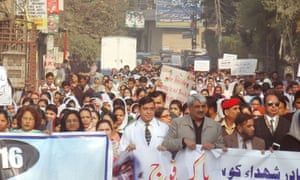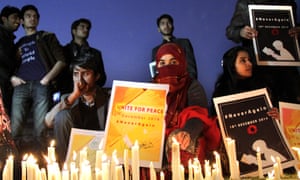
People attend a Lahore rally ahead of the upcoming first anniversary of the Peshawar school attack.
It only takes the crash from nearby building work to send the teenage survivors of one of Pakistan’s worst ever terrorist attacks diving for cover.
“Everyone is traumatised inside the school,” said Mehran Khan, a 14-year-old student at the Army public school in Peshawar. “We are all thinking that there will be another attack.”
A year ago on Wednesday, Khan was shot three times when gunmen armed with suicide bombs stormed into the school auditorium where several year groups were watching a first-aid lecture. Most of the boys were unable to get to the exits, turning the hall into a scene of particular horror. The following day, when television crews were allowed in, the hard floors were still wet with blood.
More than 140 students and staff were killed, many of them executed at point-blank range by gunmen who also detonated bombs around the school buildings.
APS reopened just one month after the attack. But pupils and parents complain of ongoing trauma for which many are still receiving psychological help.

A candlelit vigil for victims of the Peshawar school attack.
The auditorium where Khan almost died has been converted into a basketball court, and a new hall has been built elsewhere on the school’s neat campus. Security is extremely tight with armed guards and metal detectors at the school gate.
“There are new buildings, my friends are gone and some of the teachers are different,” said Khan, who took eight months to recover from his bullet wounds and a broken leg. “Everything has changed.”
Many say Pakistan itself has changed. After the attack all schools were ordered to rapidly build walls and extra defences. To the consternation of some of Pakistan’s European donors the country abandoned an informal moratorium on the death penalty and has so far executed more than 300 death row prisoners.
Most observers credit the attacks with spurring the country into tackling domestic terrorism like never before. The prime minister, Nawaz Sharif, publicly recognised Pakistan’s longstanding ambivalence on the matter, vowing an end to the distinction between “good and bad Taliban”.
A year after the APS attack, the tide of violence has fallen dramatically. “There are no more bomb blasts, all the terrorists have left Pakistan now,” said Ajoon Khan, a lawyer whose 15 year-old son Asfand died in the auditorium. “The country is changed completely because of the sacrifice of our children.”
The army, already Pakistan’s most dominant institution, has become even more powerful in the wake of the APS attack. Constitutional changes established empowered military courts to try civilians, bypassing a glacially slow judicial system where judges are easily intimidated.
Those military courts have convicted some of the men said to be linked to the APS attack. Four were executed this month although little information has been given about their exact role in the plot.
Khan, who is chairman of a group of affected parents, said he would have preferred the executions to have happened in public. Like many other parents, he rushed straight from his workplace when he heard of the attack only to discover Asfand was trapped inside.
He later found the body of his football-mad son among more than 100 laid out in a hospital corridor. He buried him that night still wearing his bloodstained school uniform and with the mobile phone he had with him at the moment of death. “We are all still trapped on 16 December,” he said. “None of the parents have moved on.”
He is furious with the army, which he says has escaped censure over an attack in the middle of Peshawar’s military enclave. Despite the greater willingness to confront domestic militant groups, critics say not enough has been done to tackle the religious extremism that permeates society.
Scant progress has been made on regulating the country’s religious seminaries, one of the items on a much trumpeted “national action plan” drawn up in the wake of the APS killings.
Jibran Nasir, a lawyer and activist, led unprecedented protests outside Islamabad’s notorious Red Mosque following the school massacre to demand authorities arrest Abdul Aziz, the mullah who attempted to introduce Taliban-style moral policing in the capital in 2007.
“A year ago we were standing outside the Red Mosque and we forced the police to register a first investigation report against him,” he said referring to the preliminary stage of a police investigation. “But Aziz is still there. The government has lost all the momentum that civil society handed them.”
Supposedly banned sectarian groups are still finding ways to field candidates in local elections, he complained, while recent weeks saw the burning down by a mob of a factory owned by Ahmedi Muslims, a religious minority that is widely despised.
Khan, the 14-year-old survivor who hopes to join the army after finishing school, said Pakistan should have confronted its terrorist menace far sooner. “If the national action plan had been launched before then the attack would not have been possible,” he said.
[Source:-The Gurdian]
